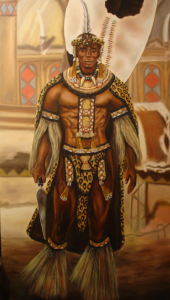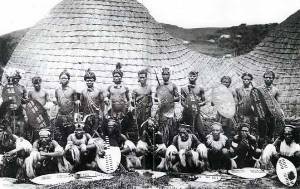Whenever most people hear the name Zulu they would generally recall the 1986 South  African Broadcasting Corporation (SABC) television miniseries Shaka Zulu written by Joshua Sinclair based on his 1985 novel of the same name. In said series the famous South African actor Henry Cele portrayed the military genius Zulu king Shaka kaSenzangakhona (c. 1787 – c. 24 September 1828) also known as Shaka Zulu.
African Broadcasting Corporation (SABC) television miniseries Shaka Zulu written by Joshua Sinclair based on his 1985 novel of the same name. In said series the famous South African actor Henry Cele portrayed the military genius Zulu king Shaka kaSenzangakhona (c. 1787 – c. 24 September 1828) also known as Shaka Zulu.
Nevertheless I want to look at a period prior to Shaka rising to the stature of monarch and his implementation of military reforms and innovations. I want to look at how the Bantu engaged in warfare.[1] According to The Washing Of The Spears: The Rise And Fall Of The Zulu Nation by Donald R. Morris at that time the:
“military institutions these people had developed were simple but served their needs. A mild and almost continual warfare was the norm. It was, in the beginning, a casual warfare with limited objectives. Gratuitously aggressive clans were rare, and the rights to grazing lands the major source of tension. A clan defended itself against encroachments on its territory, and it forced weaker neighbors to vacate adjacent territory, but the defeated clan moved and the tension vanished. With the casus belli settled, there were no hard feelings or bitter blood feuds to pass on to subsequent generations” (Morris; 37).
From the offset Morris uses language not generally found when speaking of martial conflict. He employs terms such as “simple”, “mild” and he mentions how the combatting parties had “limited objectives”. He also remarks how once the conflict had come to a close which generally was over real-estate the matter would be concluded. Morris continues on to explain how these battles would be carried out between the contentious clans.
“Most clan conflicts were settled in a frequently prearranged battle. The two clans met at a convenient location, often facing each other over the banks of a small stream, and the women and children assembled on a nearby hillock to shout encouragement and watch the fun. A long preliminary period was devoted to shouted boasts and taunts, and individual warriors ran forward to giya-howling self-praises and dealing death to imaginary foes. The two mobs then edged toward each other, hurling assegais as the range closed. Eventually one side or the other would sense a moral ascendancy and hazard a charge, which usually sufficed to send the enemy bolting. The defeated clan lost cattle and the land, and captives had to be ransomed, but crippling damage was rare and extermination unheard of” (Ibid.; 38).
Morris points to other phenomena that is uncharacteristic of war. He states that the clans met a convenient local with their families in tow. They spent a large amount of time boasting and taunting each other. Then after they hurled spears at each other one group would charge the other sending that clan to flight ending the conflict with no blood being spilled. Now what warzone that you know of was welcoming enough for whole families to venture to in order to spectate? Morris the author referred to it as “fun”. To this writer it appears that the Zulu/Bantu conception of war resembled a contemporary “step-shows” found on the campuses of historically-black fraternities and sororities in the US than any concept of warfare that we are commonly familiar with.[2]
Now before moving forward with my overall point one must also recognize that there was a dark side to the initial Bantu/Zulu style of warfare seen in the worse outcomes of such clashes. When “a clan would be forced off its territory and fail to find new land. It then had little choice but to go marauding, in a desperate attempt to secure a new home by displacing another clan” (Ibid.). If a clan found itself without a said clan would attempt to take over another clan’s territory and if that clan was weak the invading clan would “engage in predawn raids, burning kraals, driving off cattle, and slaughtering its victims as they scrambled, one by one, out of their burning huts” (Ibid.). While not justifying this gruesome act it must be recognized that these occurrences was rare and the people behaved in this fashion at the point of sheer despondency. With that being said I will now proceed to my main point.
 I find it interesting that the dominant or White society has exhausted much time and energy depicting Black people in general as “savages”, “monsters” that are “naturally violent” but for centuries these African peoples had conducted themselves in a relatively humanized fashion prior to the exaltation of King Shaka when conflict arose between two clans or ethnic groups. Also the only reason why their view of war was modified by King Shaka was so that they could defend themselves from the brutality of the White European colonizers that was encroaching on their territories. So in essence the Bantu whose name in its various forms denotes the “people” or “humans” had to give up their humanity to make an attempt to defend themselves from those that claimed to be “civilized”.
I find it interesting that the dominant or White society has exhausted much time and energy depicting Black people in general as “savages”, “monsters” that are “naturally violent” but for centuries these African peoples had conducted themselves in a relatively humanized fashion prior to the exaltation of King Shaka when conflict arose between two clans or ethnic groups. Also the only reason why their view of war was modified by King Shaka was so that they could defend themselves from the brutality of the White European colonizers that was encroaching on their territories. So in essence the Bantu whose name in its various forms denotes the “people” or “humans” had to give up their humanity to make an attempt to defend themselves from those that claimed to be “civilized”.
Works Referenced:
Donald R. Morris. The Washing of the Spears: A History of the Rise of the Zulu Nation under Shaka and Its Fall in the Zulu War of 1879. New York: Da Capo Press, 1998.
___________________________________________________
[1] Bantu is used as a general description for the 300–600 ethnic groups in Africa who speak Bantu languages and Zulu being one of them.
[2] Note should be taken that “stepping” finds it origin in military exhibition and close-order drills as well as African foot dancing.
Reblogged this on The Afrikan Voice.
LikeLike